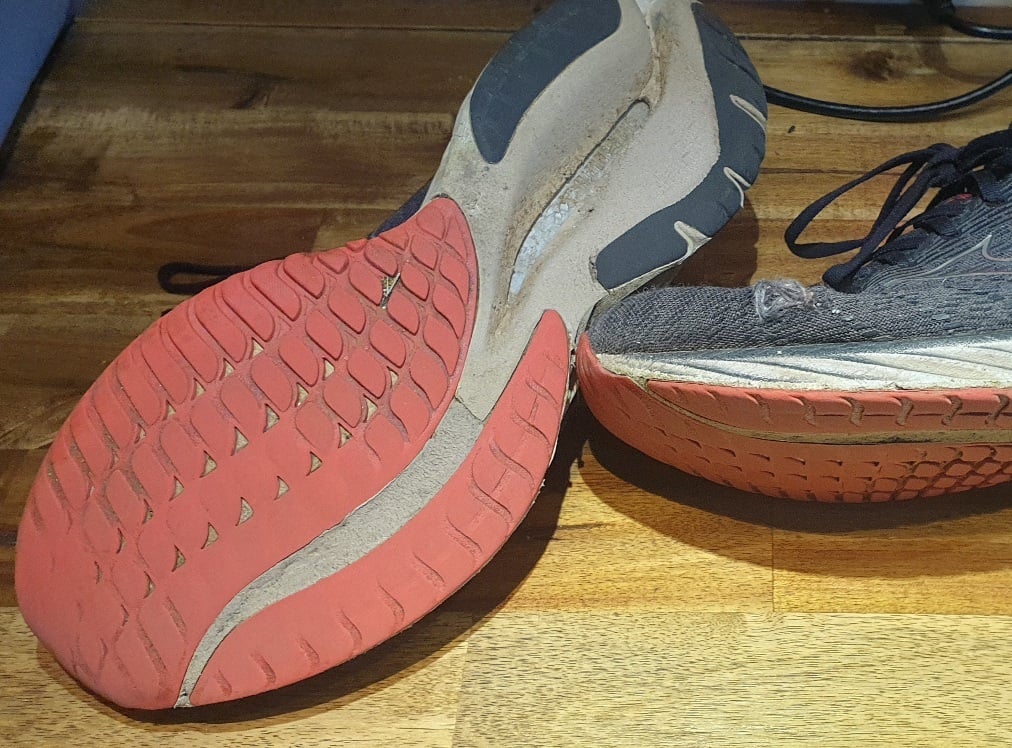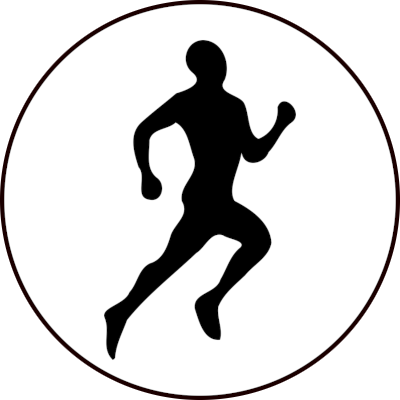These are my Mizuno Enerzy. They are only a few years old, but they survived my 110kg to 75kg, 5km in 50 mins to 10km in 55 mins fitness journey. Its getting a bit embarrasing at the gym when people see the duct tape. Ive already stitched the holes up three times.
How long are running shoes supposed to last you? They are expensive! Are they expected to do this, or should they last much longer?
Those look like leg pain incarnate! I used to run every day for a few years and would get through 3 pairs of shoes at least in a year. Depends on the shoes but they always started affecting my body detrimentally between 600 and 800km, I think the best ones I had may have lasted to 900 but it wasn’t the norm.
Yes they may be expensive but you can find bargains if you look and the cost is worth not fucking your legs up IMO.
What brand do you use? And how much do you pay each time?
My favourites are Saucony, Adidas or Hoka. Adidas I would shy away from recommending to other people though as I’ve had some amazing shoes from them and some fucking terrible shoes so it is some what hit and miss. For me Saucony are always on point but always tend to be harder to find a good deal.
I usually trawl eBay and a few different websites looking for current stock they are trying to move and often end up with different shoes every time because of this, although j don’t mind that too much. I have size 12 feet which usually narrows down my choices anyway but I’d say I average around £40 - £45 sort of area for shoes. Sometimes I’ll have to buy slightly more expensive. I got some Saucony once that were second hand and worn for about 50km for £15 and they lasted a good 800km.
When you gotta tape 'em together that should be the signal that they need to be retired lol
As others have said, it’s usually the Midsole foam going flat that causes the issues. That usually happens long before any wear is visible. I used to do 600-800km in regular running shoes. After that, knee and hip pain set in pretty predictably.
But changing shoes twice a year is super annoying, so I’ve switched to barefoot shoes. Those don’t have a midsole to begin with, so you can wear them until they literally fall apart. My current pair of Xero Shoes is on about 2k km or so and still going strong!
Generally [source? I’ve heard it] it’s recommended to change them every 600km to 1000km. The issue is not only the upper fabric but the state of the soles, that tend to lose grip and shock absorption and that makes you prone to injuries. But it depends on so many factors (weight, where you run, shape of your foot…)
That being said, the feeling you get using them should really tell you if they need to be changed. If you feel like hitting bricks when you run and your knees feel sore, maybe look for another pair.
I’m sure people at the gym are quite happy to see a dedicated person. Nobody gives a fuck about the state of your shoes, aesthetically speaking.
Well they are getting a bit thin at the front. Plenty of cushion left towards the heel though.

When I ran long distance in high school I’d replace my shoes every year, over xc and track they probably had around 800km on them, some years a bit more others less. I learned quickly that changing brands or even models from what worked for me was bad so always got the Mizuno waveriders that were available that year.
As others noted you’ll feel the midsole start that lose its cushion well before you see wear in it. Even when it looks like it has bounce, it may not be providing what you need to cushion the forces from running (a normal pace can see many times your body mass as force on your foot as you and you want to absorb a lot of that to not ruin your knees and hips).
how can you run with a toe box that narrow?
it hurts even to look at 😖
I just assumed running was supposed to hurt 🤷♂️
I usually get around 1200km out of my pairs, but I also tend use them longer than ideal. Some will last longer than others, e.g. I had a pair of saucony triumph were the foam held up very well.
Generally it is not the upper or outsole that makes retiring the shoes necessary (they’ll still look visually fine), but the midsole going flat. Which is kind of the point for which one buys specialised running shoes: the shock absorption and energy return the midsole foam provides.
For me the sign that a shoe is nearing the end of its useful life is usually that I start feeling the impact more in my knees after longer runs. But imo getting a second pair and still using the older one occasionally let’s you get a bit more mileage out of your shoes. Also helps with comparing new vs old.
Generally I agree that running shoes are expensive, and I was surprised how much it ends up costing if you run serious mileage. But there are ways to save money and I usually spend between 50-80€ on my daily trainers, which is roughly a bit below half of the sticker price.
Buy online, look for sales at the end of the season and before new releases, buy last years models, and be flexible. For buying online to get the size right look at the cm sizing (or jpn sizes that equal cm), which for me so far has always been spot on, where EU sizes very. Also some models are usually good value, like for example the puma velocity nitro (version 1,2 or 3 doesn’t matter too much so, all are solid).
I never considered buying online. But I always felt it was such a drag to go into the physical store and get shamebaited by the salespeople.
How can you be sure ypull like the fit of what you buy in stores?
Most online stores for running shoes have pretty good return policies, so i’d just buy from those that allow returns. But i’ve only had to use returns once or twice between my many orders. Tbh i’ve only ever bought my first pair locally, felt ripped off paying 140€ for a pair of asics gt-2000 and ever since ordered online without issues.
You want them to be comfortable and with roughly 1 thumb width of space in the front. Also lacing matters a lot. I’ve had shoes hurt after a few km running, because i laced them too tightly. Which was fine at the start, but during your run your feet will swell up a bit (that is also what the extra space in front helps with).
As said for me the thing that works is to google a size chart for the model and not go by EU sizes, but cm (or JPN sizing, which equals cm). Those are very consistent between brands. For example my “main” brand is probably saucony where i have a EU46, which correlates to 29,5cm. I had my Brooks Hyperion tempo in EU45,5, which for brooks is 29,5cm. And i had 3 pairs of puma so far (2 velocity, 1 liberate nitro) all in 46 that in reality are actually a bit long, which tracks with the fact that for puma EU46 is 30cm. So i know i ideally want 29,5cm with 30cm being fine (but anything shorter doesnt work).
Beyond that it is just minor fit differences, e.g. altra shoes have wide toe boxes, nike are said to run a bit narrow and so on. Usually you can learn these from a decent review, if they mention it.
That said for this to work you need to either know your shoe size at least once. Either from your old shoes, trying some in store, or you estimate with the guides on online sites (and return if they end up the wrong size).
As for which type of shoes to buy, unless you have a rotation of multiple shoes you’ll probably just want a decent and versatile daily trainer, which basically every brand offers.
Well I gave it a shot and got some discounted Mizuno trail run shoes in my size. Im sure they will be fine. Thanks for the advice!
Nice, hope it works out for you! Usually brands are consistent within their lineup, so that should make things easier. Mizuno is one of the brands I’ve not tried yet, but might if I find a good deal.
Also since I just got another pair in the mail myself, which kind of helps my point: Found a good deal on a pair of craft shoes (pro Endur distance) and actually ordered in EU45 (a full size smaller than my typical shoes), since the size guide had that listed as equalling 29,5cm. Never had one of their shoes before.
Having them in person now the length seem correct and I have about a thumb width of space. I only have to test if the toebox shape works for my large toe during long runs, but that is something I couldnt really determin in a shop either.
I use mine for around 800km. I use 2 sets per year, but honestly I should probably switch sooner than I actually do.
deleted by creator
Holy, poor things! They look half-dead and the other half is on death’s door too…
You’ve gotten a lot of great responses already. Basically, the weak point in a shoe is the foam, and you start to feel the foam go before you see it. That’s one reason it’s nice to have a few pairs of shoes to rotate through. You can run in one pair, and the next time you do a similar length/time in the other pair, and you’ll be able to start to feel when your ankles/knees/back or whatever get sore for no reason.
In terms of the distance you get, it really depends on speed, your weight, your technique (heavy heel strikers probably wear through shoes quicker), and the surface you run on. Possibly the biggest factor is the amount of midsole foam, though. The foam stilts that are popular these days may only last you 400 km, while a more typical shoe gets 800 km.
Like another commenter said, “barefoot” shoes can last a very long time. You probably don’t want to go all-in on those unless you want to do some more homework on them, but it’s something to consider if you are budget constrained.
What I do now is just stick to a brand that I know works for me. Shoes are built on “lasts” which are basically a foot-like form. Traditionally, they’d be a wooden thing that a cobbler would wrap leather, etc, around. Now, it’s basically just the 3D foot model. If you get 2 shoes built on the same last, they are going to fit your foot similarly, so it’s not so bad to buy online. They make new model numbers every year or so, and when a new model is in, the old model goes on sale. When they got 50% off, I’ll buy a couple pairs. Obviously that only works if you have the money/space to do it, but it is helpful.
You got alot of answers already. After they have passed the life as a running shoe you can still use them as a regular walking shoe, gym shoe, casual whatever.
Don’t throw them away just because someone they only last 700-900km as a running shoe.
I’m a bigger guy (over 200 pounds) who runs marathons so my concern is the cushioning and the impact on my feet. I put a 500 km limit on my running shoes, after that they graduate to walking shoes or general gym shoes. My go-to are Asics, and I wait until a new model comes out and then buy last season’s shoes at a discount, anywhere from $60-$110 for a pair depending on what color I want.
The continental rubber on adidas shoes lasts forever…
The rubber on their top end shoes like takumi sen and pro 3 is only 1-2mm thick but i’ve hit 800-900km in them
Also i’m a pretty light person so i dont wear out the foam much
I get 5-800 km of of my shoes, I’m generally pretty hard on heels, with a heel strike and a short left leg. I only run, and I do it close to 90km a week, so rotation, and discount shoes are the way.






